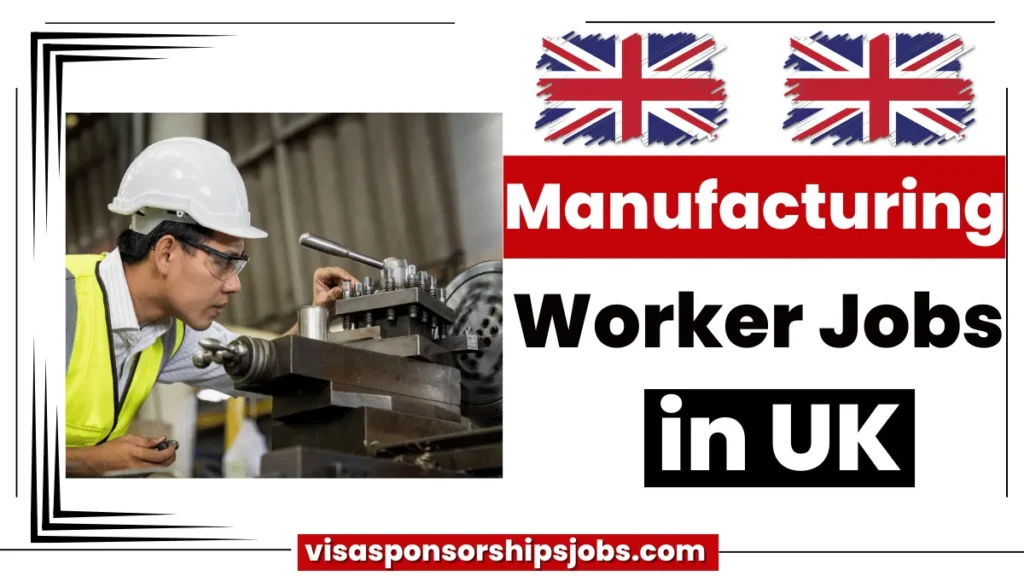
The manufacturing jobs in UK has long been a cornerstone of the economic system, providing a range of processing opportunities for both domestic and international people.
As the business continues to grow and develop, the demand for skilled production workers increases. For those thinking of getting a manufacturing worker job in the UK, this blog post will be beneficial.
Details of Manufacturing Worker Jobs in UK
- Job Title: Manufacturing worker
- Country: UK
- Company: Various Companies across the UK
Requirements
Manufacturing worker jobs in the UK come with exact requirements depending on the position and industry. However, some extended qualifications and competencies are usually popular:
- Educational qualifications: A regular high school degree or equivalent is a minimum requirement. For specialized roles, technical or professional training may be essential.
- Experience: Previous experience in manufacturing or a related field is highly valued. Some positions may require unique experience with machinery or manufacturing techniques.
- Teamwork: The ability to paint well in a crew environment is regularly required as many production techniques involve collaboration.
Benefits
Working in a manufacturing zone in the UK offers several advantages:
- Competitive pay: Manufacturing jobs often offer exact wages, especially for skilled positions.
- Career progression: Many businesses provide opportunities for advancement and professional development.
- Job security: The demand for production workers remains consistent and provides experience in process security.
- Benefits Package: Health insurance, retirement plans, and other blessings are usually presented.
- Work-life balance: Many production jobs work in shifts, with flexible painting schedules to consider.
- Training and development: Employers often spend money on training and development packages to groom the talent of employees.
- Diverse Opportunities: The manufacturing quarter encompasses a wide range of industries that offer numerous job opportunities.
Duties
The duties of production workers can vary widely depending on the specific activity and business. Common duties include:
- Machine operation: Operation and maintenance of production machines.
- Product assembly: Putting elements together to create finished products.
- Inventory Management: Keeping materials and goods in stock.
- Maintaining cleanliness: Ensuring a clean and safe work area.
- The following safety protocols: Follow safety recommendations to avoid injury.
- Problem Reporting: Identifying and reporting any manufacturing or equipment problems.
Salary
Earnings for manufacturing jobs in the UK can vary quite a bit by role, industry, and location. In common:
- Entry-degree role: £18,000 – £22,000 commensurate with the 12 months
- Skilled workers: £23,000-£30,000 relying on 365 days
- Supervisors and Managers: £35,000-£45,000 commensurate with the year
Types of Jobs
The production area offers a wide variety of task options. Here are ten types of manufacturing worker jobs in the UK:
Production Line Worker: Responsibilities encompass working machinery, assembling merchandise, monitoring production traces, and making sure of fine manipulation.
Machine Operator: Responsibilities encompass putting in, running, and preserving production systems, troubleshooting troubles, and ensuring green manufacturing. Skills required are technical competencies, expertise in equipment, and trouble-fixing competencies.
Assembly Line Worker: Responsibilities consist of assembling additives or products in line with specs, operating on a conveyor belt, and performing repetitive obligations correctly. Skills required are guide dexterity, stamina, and ability to work quickly.
Maintenance Technician: Responsibilities encompass repairing and keeping equipment, acting preventive protection, and troubleshooting mechanical troubles. Skills required are mechanical flair, expertise in maintenance tactics, and technical competencies.
CNC Machinist: Responsibilities encompass working computer numerical control (CNC) machines, programming equipment, and producing precision elements. Skills required are CNC programming understanding, precision, and technical talents.
Fabrication Worker: Responsibilities encompass slicing, shaping, and assembling metallic parts, operating with diverse gear and systems, and following blueprints. Skills required are technical talents, the capacity to study blueprints, and experience with metalworking equipment.
Forklift Operator: Responsibilities include working forklifts to move substances, loading/unloading vans, and keeping stock data. Skills required are forklift certification, physical health, and correct spatial focus.
Production Supervisor: Responsibilities encompass coping with manufacturing groups, making sure schedules are met, keeping safety requirements, and improving productivity. Skills required are leadership talents, information on production approaches, and extraordinary organizational capabilities.
Application Process For Manufacturing Worker Jobs in UK
Securing a manufacturing activity in the UK through visa sponsorship involves several steps:
- Research: Identify organizations that sponsor visas and offer open positions in the production quarter. Websites like Indeed, LinkedIn, and the organization’s career site are good starting factors.
- Prepare your CV: Tailor your CV to highlight relevant hobbies and skills. Make sure it meets British Standards.
- Applying for a visa: Apply for a permanent visa through the UK Government website. You will want to offer documentation such as your business, qualifications, and financial documents.
- Biometrics Meeting: Attend a biometrics meeting and offer your fingerprints and photo.
- Visa Decision: Wait for your visa software to be processed and authorized.
- Relocation: Once your visa is approved, you can move to the UK and start your new assignment.




